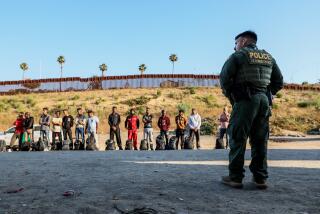Border Patrol agent can be sued in fatal shooting, court rules
- Share via
Reporting from WASHINGTON — A U.S. Border Patrol agent can be sued for firing across the border and killing a 15-year-old Mexican boy, a federal appeals court ruled Monday, a decision with potentially broad consequences for the highly charged issue of law enforcement’s use of deadly force along the border.
The decision by a three-judge panel in New Orleans said the allegations in the 2010 shooting of Sergio Adrian Hernandez Guereca, if proven in court, would amount to “an official abuse of power so arbitrary as to shock the conscience.” Because of that, the case can go forward, the judges ruled.
Lawyers in the case say it’s the first time that an appeals court has extended the protections of the U.S. Constitution to a noncitizen on the Mexican side of the U.S. border.
“It’s a huge human rights victory,” said attorney Robert Hilliard, who represents the boy’s family. “It gives you a voice inside a U.S. courtroom. They have to focus on, ‘Did the border agent do something wrong?’”
But the 2-1 decision was written narrowly and is unlikely to be the final word on the case. The lawyer for the agent who shot Hernandez said he would ask the full appeals court to consider the case.
“Classifying it as a leap is an understatement,” said attorney Randolph J. Ortega. “They have extended the protections of the U.S. courts into foreign countries where the U.S. does not have any jurisdiction.”
Border Patrol officials declined to comment on the decision, which reaffirmed the long-standing rule that the agency itself cannot be sued because of the government’s sovereign immunity. The agent, Jesus Mesa Jr., is liable to the suit because his actions went beyond his lawful authority, the judges said.
“No reasonable officer would have understood Agent Mesa’s alleged conduct to be lawful,” they wrote.
The ruling comes as the Border Patrol has tried to put more controls on agents’ use of deadly force after a series of shootings that raised questions about the agency’s training and internal investigations.
The agency recently revised its policy on the use of force. And recently the agency moved aside its head of internal affairs, replacing him with an agent from the FBI.
Those moves came after a scathing internal report that criticized the agency for some shootings. Some agents had stepped in the way of moving cars and fired their guns at rock throwers when they could have simply retreated. The agency in May issued new guidelines that said agents should no longer fire at cars, but did not address how agents should respond to “rocking” attacks.
At least 22 people were killed by Border Patrol agents, mostly on the Southwest border, between January 2010 and December 2013, and many more were injured. Six cases involved Mexican citizens in “trans-boundary” shootings, according to Mexican embassy officials.
The Border Patrol has terminated no agents, nor have any resigned in any shootings or in any other allegations of excessive force, including beatings, according to Border Patrol information released in response to a public records request.
Eight agents have been suspended, and five have faced reprimands. Mesa is still on the job.
According to the complaint in the case, Hernandez was one of a group of youths who were running up a concrete culvert and touching the barbed wire fence on the border near the Paso del Norte Bridge in El Paso, then running back. Mesa, patrolling on a bicycle, stopped and detained one of the group, and others began throwing rocks at him.
Standing on the U.S. side, Mesa fired twice across the fence, hitting Hernandez once in the head as he was watching from underneath the bridge.
The Mexican government vigorously protested the shooting, calling it a “disproportionate use of force” and urging a full investigation.
“Mexico has also raised deep concerns about the use of lethal force by U.S. authorities against unarmed individuals, particularly when said force is applied across the international border,” the statement said.
A federal judge initially dismissed the suit brought by Hernandez’s family, saying Hernandez could not assert constitutional protections because he was a noncitizen standing on the Mexican side of the border.
But the appeals court judges said the circumstances of the case — including the fact that the Border Patrol exerts a zone of control around the border — mean that some protections could apply to noncitizens.
The spokesman for the agents’ union said the decision could have a “chilling effect” on agents.
“These are not small harassing attacks,” said Shawn Moran, vice president and spokesman for the National Border Patrol Council, referring to the rock-throwing incidents. “They are more like biblical stonings.”
Moran added that agents were now “open to civil liability for doing their job.”
More to Read
Sign up for Essential California
The most important California stories and recommendations in your inbox every morning.
You may occasionally receive promotional content from the Los Angeles Times.












